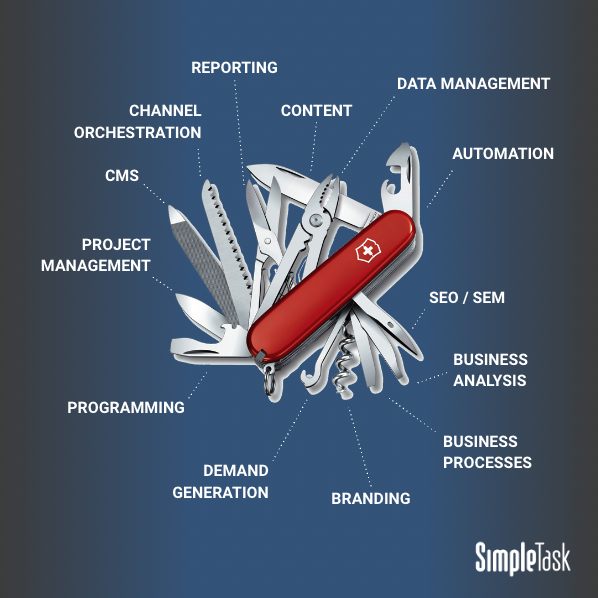Essential Skills for Mastering Marketing Technology
To truly master MarTech, individuals must resemble a MarTech Swiss Army knife, equipped with a versatile set of skills and knowledge across a wide spectrum of topics. Much like the multifunctional tool, which seamlessly integrates various functionalities into a single compact device, MarTech experts need to seamlessly combine their expertise in content creation, data analysis, automation, SEO/SEM, business strategy, and more. We have compiled a list of essential skills for mastering marketing technology.
We Identified 13+ Hard Skills

Content Creation
Effective content not only informs and engages but also drives conversions. In the world of MarTech, content creation and management are vital skills. Creating compelling and relevant content tailored to your target audience is essential. Equally important is the ability to manage, update, and optimize this content efficiently. With the right skills, you can ensure that your content remains fresh, resonates with your audience, and aligns with your marketing objectives.
Creating engaging content requires a deep understanding of your audience’s preferences, pain points, and interests. It involves crafting persuasive copy, eye-catching visuals, and multimedia elements.
Data Management and Analysis
Marketers have access to a wealth of data that can inform their strategies and decisions. However, to harness the power of data, you need strong data management and analysis skills. This includes collecting, organizing, and interpreting data to gain valuable insights into customer behavior, campaign performance, and market trends.
Data analysis tools and techniques, such as Google Analytics, can help you track key metrics, measure ROI, and optimize your marketing efforts. Moreover, data privacy and compliance are essential considerations in today’s data-driven landscape. Understanding data regulations and best practices is a fundamental skill for responsible and effective data management.
Automation and Workflow Optimization
Automation allows you to streamline repetitive tasks, improve efficiency, and deliver a personalized customer experience at scale. To master marketing technology, you must become proficient in marketing automation platforms and workflows.
Automation tools can help you create email marketing campaigns, schedule social media posts, and segment your audience for targeted messaging. Learning to design and optimize automated workflows can save time and resources while maximizing the impact of your marketing initiatives.
SEO and SEM Expertise
Search Engine Optimization (SEO involves optimizing your website and content to rank higher in search engine results, while Search Engine Marketing (SEM) focuses on paid advertising campaigns through platforms like Google Ads.
A solid understanding of keyword research, on-page optimization, and link-building strategies is essential for SEO success. Meanwhile, SEM requires expertise in creating and managing pay-per-click (PPC) campaigns, setting budgets, and analyzing ad performance to achieve desired outcomes.
Business Analysis and Strategic Thinking
Marketing technology is not just about tactics; it’s about strategy. To excel in this field, you need strong business analysis skills and strategic thinking. This involves evaluating market trends, competitive landscapes, and customer insights to develop data-driven marketing strategies.
Business analysis skills enable you to identify opportunities and challenges, make informed decisions, and adapt your marketing plans as needed. Strategic thinking allows you to set clear objectives, allocate resources effectively, and measure the impact of your marketing initiatives against your business goals.
Business Process Optimization
Streamlining workflows, reducing bottlenecks, and enhancing collaboration across teams are essential skills for mastering marketing technology. Process optimization not only improves productivity but also ensures that marketing initiatives are executed seamlessly.
By identifying inefficiencies and implementing best practices, you can achieve better results with fewer resources. Furthermore, process optimization can lead to a more agile marketing organization that can adapt to changing market conditions and customer preferences.
Branding and Identity Management
Branding skills encompass creating a unique brand image, defining brand guidelines, and ensuring consistent messaging across all touchpoints. Mastering branding in the context of marketing technology involves using digital tools and platforms to showcase your brand’s personality, values, and promises.
Demand Generation Strategies
Skillful demand generation involves identifying and targeting potential customers, creating compelling offers, and nurturing leads through the sales funnel.
Marketing technology provides numerous tools and tactics for demand generation, including email marketing, content marketing, social media advertising, and lead scoring. Understanding how to leverage these resources effectively is essential for achieving consistent and scalable growth.
Programming and Technical Proficiency
While not every marketer needs to be a programmer, having a basic understanding of programming languages and technical concepts can be a significant advantage in the MarTech landscape. Proficiency in HTML, CSS, and JavaScript, for example, can empower you to make website modifications and troubleshoot technical issues without relying solely on developers.
Additionally, knowledge of application programming interfaces (APIs) or template languageges (Ampscript or Liquid) can enable you to integrate various marketing tools and platforms, creating a more cohesive and efficient marketing technology stack.
Project Management Skills
Effective project management is the glue that holds marketing campaigns and initiatives together. It involves planning, executing, and controlling projects to ensure they are completed on time and within budget.
Project management skills include defining project scopes, setting timelines, assigning tasks, and monitoring progress. These skills are crucial for coordinating marketing campaigns, product launches, and other complex initiatives that rely on cross-functional collaboration.
Content management systems (CMS)
Content management systems (CMS) are the backbone of your digital content strategy. Proficiency in using CMS platforms like WordPress, Drupal, or Joomla is essential for creating and managing web content efficiently. Understanding the nuances of different CMS allows you to tailor your landing pages for maximum impact.
Marketing Orchestration
Marketing orchestration is the art of coordinating multiple marketing channels and touchpoints to deliver a unified and consistent customer experience. This skill ensures that your marketing efforts are cohesive and aligned with your brand’s messaging and objectives.
By mastering marketing orchestration, you can create personalized customer journeys that lead to higher engagement, conversion rates, and customer retention.
Reporting and Analytics
The ability to measure and analyze marketing performance is essential for optimizing your strategies and demonstrating ROI. Proficiency in reporting and analytics tools allows you to track key performance indicators (KPIs), identify trends, and make data-driven decisions.
Creating meaningful reports and dashboards enables you to communicate your marketing successes and areas for improvement to stakeholders effectively.

